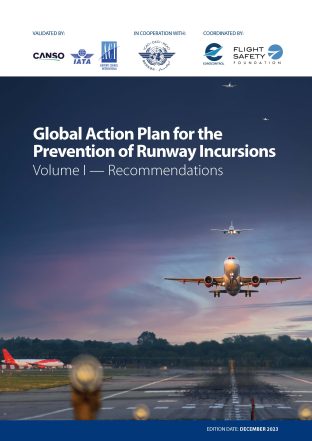BRUSSELS — Runway incursions are one of the most persistent threats to aviation safety, and the risk of incursions is likely to increase as air traffic grows, unless robust, coordinated safety defenses are implemented, Flight Safety Foundation said today in releasing the Global Action Plan for the Prevention of Runway Incursions (GAPPRI).
 “Despite efforts over the years to prevent incursions, they still happen,” said Foundation President and CEO Dr. Hassan Shahidi. “The risk of runway incursions is a global concern, and the potential consequences of an incursion are severe. Airport operations are complex and involve multiple parties, including operators, air traffic control and ground service providers. It is critical that all stakeholders work collaboratively to eliminate the risk of serious incursions.”
“Despite efforts over the years to prevent incursions, they still happen,” said Foundation President and CEO Dr. Hassan Shahidi. “The risk of runway incursions is a global concern, and the potential consequences of an incursion are severe. Airport operations are complex and involve multiple parties, including operators, air traffic control and ground service providers. It is critical that all stakeholders work collaboratively to eliminate the risk of serious incursions.”
GAPPRI was developed by an international task force of 200 aviation professionals from 80 organizations around the world. The findings and recommendations in the report are based on an analysis of multiple global and regional datasets, combined with insights from real-world experience and operational expertise.
In analyzing the data, the task force found that variability in human performance and breakdowns in communication and coordination play a role in incursions. Also, the absence of systemwide collision-avoidance barriers and technologies, combined with increased surface operations, is creating unfavorable conditions with increased risk of runway incursions. Many of the serious incidents could have been avoided through better situational awareness technologies that can help air traffic controllers and pilots detect potential runway conflicts.
The GAPPRI report contains 127 actionable recommendations addressed to airport operators, air navigation service providers, aircraft operators, manufacturers, countries and regulators, and the research community. The recommendations, which emphasize the need to strengthen operational barriers, cover such topics as improved training, empowering and equipping aviation personnel, enhanced procedures for runway operations, improved communication protocols and airport visual aids, and risk mitigation through infrastructure design.
The recommendations include immediate and near-term actions to mitigate risk, and also the development of future technologies that could be deployed in a medium time horizon.
“GAPPRI is a roadmap for addressing risk and building resilience,” Shahidi said. The Foundation will be working with global stakeholders to facilitate the implementation of the recommendations and to enable governments and industry not only to cope with expected increases in traffic but also to be proactive in anticipating and addressing problems.
The GAPPRI initiative was coordinated by the Foundation and EUROCONTROL, and the recommendations were developed in partnership with CANSO, the International Air Transport Association and Airports Council International, and in cooperation with the International Civil Aviation Organization.
The GAPPRI report is available on the Foundation’s website.
###
About Flight Safety Foundation (flightsafety.org)
Flight Safety Foundation is an independent, nonprofit, international organization engaged in research, education and communications to improve aviation safety. The Foundation’s mission is to connect, influence and lead global aviation safety.
Media Contact:
Frank Jackman
Director, Communications and Research
+1 703.739.6700, ext. 116
jackman@flightsafety.org